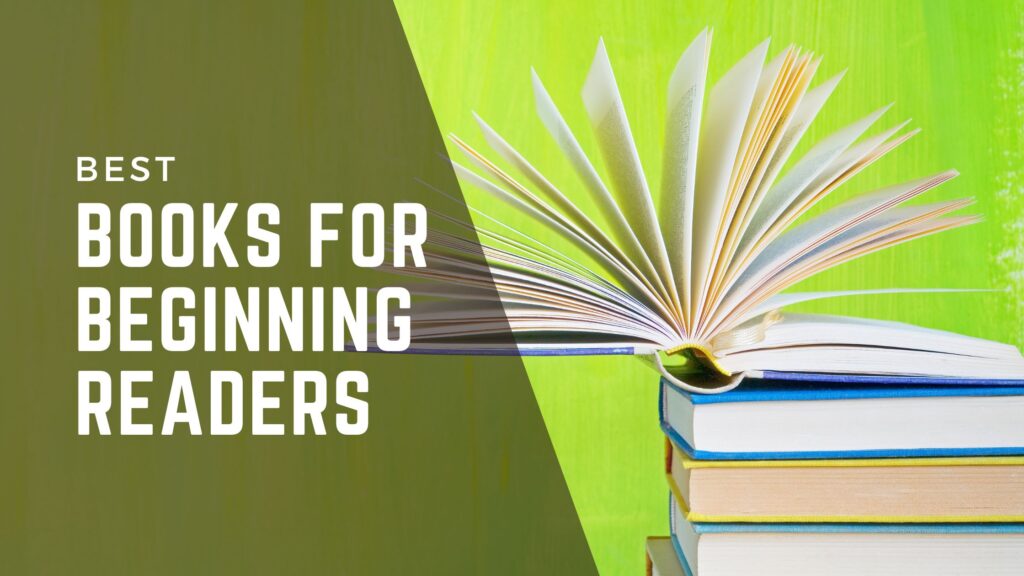Reading is much more than a simple pastime; it is a gateway to vast new worlds, boundless knowledge, and profound personal growth. For beginning readers, finding the right book can be a transformative experience. The perfect book has the potential to ignite a lifelong love of reading, fostering a sense of curiosity and wonder that stays with them forever. This blog post is dedicated to recommending the best books for beginning readers. These selections are carefully chosen to ensure that they are not only easy to understand but also deeply motivating, sparking an enduring passion for reading and learning.

Table of Contents
Why Choosing the Right Books Matters
Selecting the appropriate books for beginning readers is crucial. The right book can foster a child’s love for reading, while a poorly chosen one can deter them. Books that are too complex can frustrate young readers, while overly simplistic ones may bore them.
Reading improves comprehension, vocabulary, and critical thinking. It also develops empathy and cultural awareness. Children who read regularly perform better academically and have a broader understanding of the world.
Criteria for Selecting the Best Books
Easy to Understand
Books for beginning readers should use simple language and engaging stories. They should be easy to follow, with clear plots and relatable characters. This helps young readers build confidence and develop their reading skills.
Motivational Content
Books that inspire and motivate can encourage children to read more. Stories with positive messages, strong role models, and exciting adventures can captivate young readers’ imaginations and keep them engaged.
Age Appropriateness
It’s important to choose books suitable for the target age group. Books that are too advanced can frustrate young readers, while those that are too simple may not hold their interest. Age-appropriate books ensure that readers are challenged but not overwhelmed.
Top 5 Fiction Books for Beginning Readers
Introduction to Fiction Section
Fiction is valuable for young readers as it sparks creativity and imagination. It allows them to explore different worlds, experiences, and perspectives. Here are the top five fiction books for beginning readers:
“Percy Jackson & the Olympians: The Lightning Thief” by Rick Riordan

Summary: Percy Jackson discovers he is the son of Poseidon and must prevent a war among the gods.
Why It’s Great for Beginners: The book’s fast-paced plot and relatable protagonist make it a hit with young readers. The adventure and mythology elements keep them engaged, while the simple language makes it accessible.
“The Hunger Games” by Suzanne Collins

Summary: Katniss Everdeen volunteers to participate in a deadly televised competition to save her sister.
Why It’s Great for Beginners: The dystopian setting and strong female lead captivate young readers. The straightforward writing style and gripping story make it easy to follow.
“Holes” by Louis Sachar

Summary: Stanley Yelnats is sent to a labor camp where he must dig holes as punishment, uncovering a mysterious history along the way.
Why It’s Great for Beginners: The unique plot and quirky characters draw readers in. The book’s humor and relatable themes keep them engaged, while the clear writing style ensures comprehension.
“The Giver” by Lois Lowry

Summary: In a seemingly perfect society, Jonas is chosen to receive memories of the past, revealing dark truths about his world.
Why It’s Great for Beginners: The thought-provoking themes and relatable protagonist make this a compelling read. The simple, clear language makes it accessible to young readers.
“Eragon” by Christopher Paolini

Summary: A young farm boy discovers a dragon egg and is thrust into a world of magic and adventure.
Why It’s Great for Beginners: The epic fantasy setting and coming-of-age story captivate young readers. The straightforward writing style and relatable protagonist make it easy to follow.
Top 5 Non-Fiction Books for Beginning Readers
Introduction to Non-Fiction Section
Non-fiction helps young readers develop real-world knowledge and self-development. It provides factual information and practical insights. Here are the top five non-fiction books for beginning readers:
“The 7 Habits of Highly Effective Teens” by Sean Covey

Summary: A guide to personal development and success for teenagers, based on Stephen Covey’s “The 7 Habits of Highly Effective People.”
Why It’s Great for Beginners: The practical advice and relatable examples make it accessible. The motivational content encourages young readers to develop good habits and achieve their goals.
“How to Be a Bawse: A Guide to Conquering Life” by Lilly Singh

Summary: YouTube star Lilly Singh shares her tips for achieving success and happiness.
Why It’s Great for Beginners: The relatable language and personal anecdotes make it engage. The motivational content inspires young readers to pursue their dreams.
“The Teenage Guide to Stress” by Nicola Morgan

Summary: A comprehensive guide to understanding and managing stress for teenagers.
Why It’s Great for Beginners: The clear explanations and practical advice make it accessible. The relatable examples help young readers apply the concepts to their own lives.
“I Am Malala: How One Girl Stood Up for Education and Changed the World (Young Readers Edition)” by Malala Yousafzai

Summary: Malala Yousafzai’s inspiring story of standing up for education and surviving an attack by the Taliban.
Why It’s Great for Beginners: The inspiring story and relatable protagonist make it engage. The straightforward language makes it accessible to young readers.
“Grit for Kids: 10 Key Skills to Teach Kids for Building Resilience and Finding Success” by Lee David Daniels

Summary: A guide to developing resilience and achieving success for children.
Why It’s Great for Beginners: The practical advice and relatable examples make it accessible. The motivational content encourages young readers to develop resilience and pursue their goals.
Tips for Encouraging Reading in Beginners
Create a Reading Routine
Establishing a regular reading routine can greatly enhance a child’s literacy development. Scheduling a specific time each day dedicated to reading helps form a habit and makes reading a natural part of their daily activities. Whether it’s before bedtime, after school, or during a quiet time in the afternoon, consistency is key. Encourage a conducive reading environment—find a comfortable, distraction-free spot where the child feels relaxed and can fully immerse themselves in the story. Additionally, parents and caregivers can participate by reading aloud together, discussing the story, and asking questions to deepen comprehension. This shared activity not only strengthens reading skills but also fosters a lifelong love for books.
Make Reading Fun
Engaging children with fun reading activities can make the experience more enjoyable and less of a chore. Incorporate games and challenges, such as reading bingo, book scavenger hunts, or timed reading sprints, to add an element of excitement. Allowing the child to choose their own books can also boost their interest, as they are more likely to engage with content that aligns with their personal interests and curiosity. Consider organizing themed reading sessions based on the book’s subject and create DIY crafts or projects related to the stories they read. Celebrating achievements with small rewards, like stickers or extra playtime, can further motivate young readers to continue exploring new books and improving their skills.
Lead by Example
Children are more likely to develop a love for reading if they see their parents and caregivers enjoying books. Lead by example by setting aside time for your own reading, whether it’s a novel, magazine, or any other type of literature. Share your excitement about what you’re reading and discuss interesting points or ask questions about their books. This not only highlights the value of reading but also sets a positive role model for young readers. Additionally, create a family reading time where everyone reads their own books together, fostering a shared quiet, focused environment.
Offer a Variety of Reading Materials
Providing access to a wide range of reading materials caters to different interests and reading levels, ensuring that children find something they enjoy. Include various genres such as fiction, non-fiction, picture books, graphic novels, and magazines in your home library. Visit libraries and bookstores regularly to explore new titles and encourage children to select books that catch their eye. Access to digital books and audiobooks can also be a great way to diversify reading options and accommodate different learning preferences.
Praise and Encourage
Celebrate the child’s reading milestones and efforts. Positive reinforcement boosts confidence and encourages continued learning. Praise their achievements, whether it’s finishing a book, understanding a difficult chapter, or simply spending time immersed in reading. Providing praise and support goes a long way in building their self-esteem and motivation to read more. Where possible, offer encouragement through small rewards or acknowledgments.
By implementing these tips, you foster a supportive and engaging reading environment that helps children develop strong literacy skills and a lifelong love for reading.
Conclusion
Choosing the right books for beginning readers is essential for nurturing a love for reading. The recommended fiction and non-fiction titles in this blog are perfect for engaging young minds and inspiring them to read more. Start your reading journey with these books and share your experiences! READOTHER BLOGS
